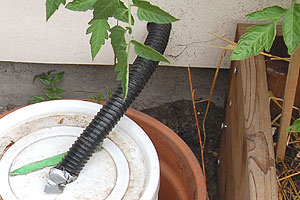 Recycling graywater from sinks, showers, and washing machines to irrigate your garden is the latest in green living—but until recently, was against the law.The home performance community, with its focus on energy efficient, safe, healthy, comfortable, affordable, and sustainable housing, is like a pot of water in full boil. Recent legislation, such as the American Recovery and Reinvestment Act of 2009, is infusing DOE’s Weatherization Assistance program with a rush of funds and the expectations of a million homes weatherized each year. Proposed legislation like the climate bill passed by the House of Representatives in June promises more money and even greater expectations of houses transformed.
Recycling graywater from sinks, showers, and washing machines to irrigate your garden is the latest in green living—but until recently, was against the law.The home performance community, with its focus on energy efficient, safe, healthy, comfortable, affordable, and sustainable housing, is like a pot of water in full boil. Recent legislation, such as the American Recovery and Reinvestment Act of 2009, is infusing DOE’s Weatherization Assistance program with a rush of funds and the expectations of a million homes weatherized each year. Proposed legislation like the climate bill passed by the House of Representatives in June promises more money and even greater expectations of houses transformed.
The Department of Labor has received hundreds of millions of dollars to support training programs for home performance professionals—from weatherization technicians to high-end builders and remodelers—and workers for the new renewable energy economy. Community colleges across the nation are gearing up for crowded classrooms full of future green jobbers. Groups such as Green for All are serving as the conscience of the movement, and remind us that the new economy has to include those who stand to benefit the most, since the old economy hasn’t served them well. Labs such as Lawrence Berkeley National Laboratory and the Pacific Northwest National Laboratory and private companies are working at a fevered pace to assist the push for greener housing with advanced modeling tools, statistical data, some of the best minds and hearts, and new technology.
There is also more energy in water, so to speak. In late July, the California Department of Housing and Community Development made a proposal for a new graywater standard to the California Building Standards Commission. The new standard was almost immediately accepted. Graywater is shower, sink, and laundry water used for gardening and for toilet flushing that would otherwise be wasted. It’s taken a while for the state to figure out how to let its citizens use this water legally. Thousands have been using it illegally until now. The standards don’t address using graywater to flush toilets, and there are restrictions. For example, graywater from washing diapers cannot be used, and graywater cannot be used to water edible roots or edible plants with the edible parts in contact with soil.
California uses up to 10% of its energy treating, moving, or heating water, so saving water saves energy as well.
37.8686 -122.267
